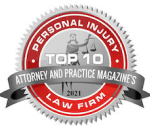Expert Guide on Negotiating Medical Bills After Settlement

Navigating the aftermath of a personal injury can be daunting, especially when faced with mounting medical bills. For many victims, the settlement is only the beginning of a financially and emotionally taxing process. Understanding how to negotiate medical bills after a settlement is crucial in safeguarding your financial recovery.
In this guide, we aim to demystify the negotiation process, highlighting the significant role that a personal injury lawyer can play. Enlisting the expertise of a legal professional not only enhances the possibility of reducing your expenses but also alleviates the stress associated with these negotiations.
Understanding medical bills in personal injury cases
When dealing with medical bills in a personal injury claim, it’s essential to differentiate between two types:
- Pre-settlement bills encompass all medical expenses incurred from the injury until the settlement is reached. These may include emergency room visits, surgeries, prescription medications, and any ongoing therapy or rehabilitation.
- Post-settlement bills refer to medical expenses that arise after the settlement has been finalized. These could result from unforeseen complications, additional surgeries, or long-term care needs that were not initially anticipated.
Health insurance plays a pivotal role in managing these expenses. For pre-settlement bills, your health insurance may cover a portion of the cost of your medical expenses, subject to eventual repayment once you receive your settlement, a process known as subrogation.
Subrogation allows your health insurer to claim a part of your settlement as reimbursement for the expenses they’ve incurred to cover your medical needs. This is often a point of negotiation, as the goal is to minimize the amount repaid to the health insurance company, thereby maximizing the portion of the settlement that remains with you, the victim.
Can a lawyer get a reduction on a medical bill?
Absolutely, a personal injury lawyer can often negotiate a significant reduction in your medical bills. Their first hand experience with the legal system and applicable negotiation strategies enables them to argue for lower amounts owed, potentially saving you a significant portion of your settlement money.
Furthermore, they can also negotiate for reduction or elimination of liens placed on your settlement by healthcare providers. Liens are legal claims that entitle the lienholder to be paid from any settlement funds received by the victim. These can come from hospitals, doctors, and other medical providers who may have provided treatment following your injury.
If you’re local to Connecticut, call us today to speak to a Hartford personal injury lawyer for a free consultation and expert legal advice.

The negotiation process
Negotiations following a settlement can be classified into 2 stages: pre-treatment negotiations and post-settlement bills.
In both scenarios, the aim is to mitigate the financial impact of medical care. Through careful negotiation and by employing strategies such as requesting itemized bills, questioning charges, and seeking discounts, patients may be able to significantly reduce their financial burden.
Pre-treatment
This process starts even before receiving treatment, especially when managing medical care linked with personal injury cases. An informed patient is a patient empowered to advocate for themselves financially and medically.
Before undergoing any medical procedures or treatments, consider requesting detailed estimates from healthcare providers. These estimates should include all expected costs for procedures, hospital stays, and any related medical services.
It’s also beneficial to inquire about cash rates or discounts for services not covered by insurance. For patients without health insurance or those with high deductibles, hospitals and medical providers often offer reduced rates. Engaging in these discussions before treatment can lead to substantial savings and avoid surprises in post-treatment billing.
Post-settlement Bills
It’s only natural for victims to feel a sense of relief thinking their financial burdens are over. In some cases though, post-settlement bills can emerge, revealing that financial negotiations continue. Negotiating these bills post-settlement is crucial, though:
- Firstly, it can significantly reduce the financial strain, ensuring that the settlement covers as much medical care as possible.
- Secondly, it may reveal discrepancies or errors in billing that went unnoticed, allowing for correct adjustments.
Negotiating post-settlement bills often involves scrutinizing each bill for accuracy, questioning any unclear charges, and negotiating payment plans or reductions in the total amount due. You should communicate your financial situation clearly and confirm whether the healthcare provider has a policy for reducing bills for patients experiencing financial hardship.
This can be incredibly difficult to do after being injured, so why not consider our assistance if you’re in Connecticut?

Key strategies for negotiating medical liens after settlement
Navigating the complex landscape of medical liens and billing post-settlement requires a well-strategized approach. Here are some key strategies to manage and negotiate these aspects effectively:
Documentation
Maintaining meticulous documentation of all medical treatments and expenses cannot be overstated in its importance.
Keep organized medical records, including detailed invoices, receipts, and correspondence with healthcare providers and insurance companies. This documentation will serve as a critical foundation for negotiating bills and challenging any discrepancies or excessive charges.
Negotiation tips
Start by requesting an itemized bill to review all charges. Also, don’t hesitate to question any services or fees you don’t understand or believe are incorrect. Many hospitals and clinics have policies for reducing bills for patients facing financial hardship; inquire about these and be prepared to present your financial situation transparently.
Understanding insurance coverage
Leveraging your insurance coverage is vital in minimizing out-of-pocket expenses. Thoroughly understand the terms of your health, auto, and personal injury protection (PIP) insurance policies. This knowledge will allow you to identify which expenses should be covered and to assertively communicate with insurance providers to ensure they fulfill their obligations.
Additionally, understanding the coordination of benefits if you have multiple insurance policies can help maximize your coverage.
Dealing with liens
Liens placed on your settlement by healthcare providers or insurers represent a significant hurdle. The first step in managing these is to obtain a detailed list from your attorney of all liens asserted against your settlement.
With this information, you can assess each claim’s validity and negotiate accordingly. It’s often possible to negotiate a reduction of the lien amounts, especially by demonstrating financial hardship or discrepancies in the charged services.
Employing these strategies effectively can help ensure that your settlement covers as much of your medical expenses as possible and safeguard your financial well-being following a personal injury.
By how much can lawyers reduce medical bills?
While there is no universal answer to how much lawyers can reduce your medical bills, it’s not uncommon for reductions of 25% to 60% to be achieved. The extent of reduction heavily depends on the circumstances of each case, such as the amount of the settlement, the total medical costs, and the lawyer’s skills.
Experienced attorneys will understand this complex terrain, making them well-equipped to negotiate substantial reductions.
Additionally, lawyers can argue for lower settlement figures based on their understanding of medical practices and potential billing errors, further reducing the financial burden on their clients.
How long will the negotiations take?
The duration can vary significantly based on several factors:
- Complexity of the case
- Number of providers involved
- The total amount of the liens
Generally, it can take anywhere from a few weeks to several months. Patience is key during this process as both sides come to a payment agreement that is fair and reasonable. Quick resolutions are rare, as each party aims to advocate strongly for their interests.
It’s important for clients to remain engaged and responsive throughout this period to ensure the process moves forward without unnecessary delays.
Additional tips and considerations
While we’ve covered the majority of what you need to know on how to negotiate your medical bills after receiving your settlement amount, here are some further tips:
Seeking financial assistance
Exploring programs and resources for additional financial support is a vital step for individuals grappling with medical bills post-settlement. Many non-profit organizations, charities, and government programs offer financial assistance to those struggling with healthcare expenses.
For instance, programs specifically designed for patients with certain conditions, such as cancer or chronic diseases, can provide significant financial aid and support. Additionally, local community resources and social services may offer assistance programs to help cover medical and living expenses.
Investigating these options can provide a safety net during challenging times and alleviate the stress associated with overwhelming medical bills.
Hiring a personal injury attorney
The complexity of navigating medical bills, insurance claims, and liens post-settlement highlights the benefits of hiring an experienced personal injury attorney. While we’ve already mentioned the potential for reducing medical bills through negotiations, an attorney can provide numerous other advantages.
Michael and his team have a deep understanding of personal injury law and can help you navigate legal processes, advocate on your behalf, and ensure that you receive a fair settlement. Additionally, we are well-versed in dealing with aggressive insurance companies and healthcare providers that may try to reduce or deny their coverage obligations.
Prioritizing payments
In some cases, negotiating medical bills and liens may not be possible or may take an extended period. In such situations, it’s essential to prioritize your payments and focus on the most critical expenses.
For instance, if you have outstanding bills for ongoing treatments, it may be best to focus on paying those first to ensure that your treatment continues uninterrupted. Additionally, some providers may be willing to work out a payment plan or offer discounts for upfront payments, which can help ease the financial burden.
How Connecticut’s laws impact this process
One notable regulation is the “collateral source rule“ which prevents the reduction of damages awarded for personal injury by any amount that has already been compensated by a collateral source, such as health insurance. This rule can influence negotiations, as insurers may not deduct benefits that the plaintiff received from other sources when calculating settlements.
Connecticut also follows a modified comparative negligence rule, which means that a plaintiff’s compensation can be reduced based on their percentage of fault in the incident that caused their injuries. However, if the plaintiff is found to be more than 50% at fault, they cannot recover any damages.
Victims also need to be mindful of the Connecticut personal injury statute of limitations, which limits the time frame in which they can file a lawsuit. In Connecticut, this is typically within two years from the date of the incident.
As for medical liens, Connecticut law allows healthcare providers to place liens on personal injury settlements for services rendered related to the injury. This can impact the final amount a plaintiff receives, as portions of the settlement may need to be allocated to satisfy these liens.
The state encourages negotiation and mediation to resolve disputes over medical liens and bills, which can be a critical process for individuals looking to reduce their medical debts post-settlement.
In Connecticut and need expert guidance?
If you’re facing the daunting challenge of managing medical bills and navigating the intricacies of personal injury settlements in Connecticut, Chambers Law is here to help!
Our law firm brings a wealth of expertise and a compassionate approach to each case, ensuring that you’re not just another file on a desk. We understand the impact that injuries and accompanying financial burdens can have on your life, and we’re committed to advocating on your behalf for the best possible settlement and reduction of medical bills.
Contact Chambers Law today for a free and comprehensive consultation where we can discuss the specifics of your personal injury case and explore effective strategies for medical bill negotiations.

Key takeaways
Efficient negotiation of medical bills and liens is paramount in maximizing the benefits of a personal injury settlement, especially for those facing significant medical expenses post-accident. The process not only aims at reducing the financial burden but also ensures that the victim receives the full spectrum of care needed for recovery without depleting the settlement funds prematurely.
Given the daunting complexity of dealing with healthcare providers, insurance claims, and legal nuances, the expertise of a personal injury attorney becomes invaluable. Not only can they leverage their knowledge to advocate for lower medical costs, but they also understand the intricacies of state laws that impact the negotiation process.
In states like Connecticut, where laws such as the “collateral source rule” and “modified comparative negligence” come into play, the strategies for managing and negotiating medical bills can significantly influence the outcome of a settlement.
